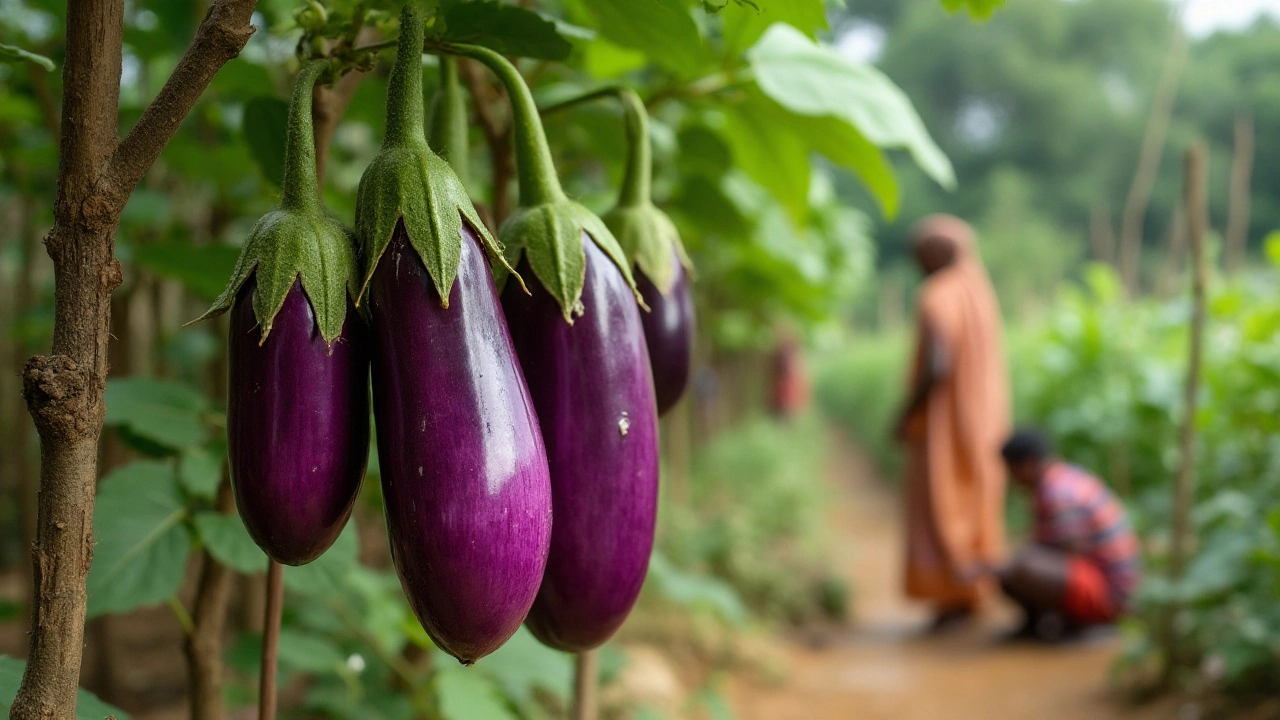When we think of regal titles bestowed upon vegetables, the eggplant proudly claims the name 'queen' in many parts of India. This might seem unusual at first glance, yet the reasons are as diverse as the eggplant itself. Known for its glossy purple skin and unique flavor, it's a staple in numerous Indian dishes, admired for its adaptability in various culinary traditions.
As integral as it is to the kitchen, the eggplant is equally cherished in the gardening realm. It's a rewarding crop that grows well under the right conditions, offering a bounty of produce from a well-tended patch. Journey through this article to understand why the eggplant isn't just another plant in the garden but a royal title-holder that commands respect and admiration from both chefs and gardeners alike.
- The Royal History of Eggplant in India
- The Nutritional and Culinary Benefits
- Growing Conditions and Best Practices
- Common Varieties and Their Characteristics
- Eggplant Cultivation Tips for Gardeners
The Royal History of Eggplant in India
The storied journey of the eggplant, or brinjal as it is known locally, dates back centuries across the Indian subcontinent, where it has long been an integral part of the cultural and culinary tapestry. Native to the Asian tropics, the eggplant is believed to have originated in India, where ancient texts and scriptures reference its existence and use. Rooted in this rich history is the eggplant's journey from its wild ancestors to the domesticated varieties cherished today. Historical evidence suggests that it was cultivated over 4000 years ago, with seeds unearthed in various archaeological sites pointing to its early mankind association. This deep ancestry has contributed to its vital role in Indian societies.
The eggplant was not merely a food source; it held a symbolic status and was often associated with royalty. Its vibrant, rich color and unique flavor made it a favorite in royal kitchens and among the elite, earning it the prestigious title of
The Nutritional and Culinary Benefits
When it comes to the nutritional prowess of the eggplant, one could argue it's as majestic as its royal title suggests. This vegetable, often mistaken as a fruit due to its botanical classification, is a powerhouse of nutrients despite its modest appearance. Eggplants are low in calories, making them an excellent choice for those seeking wholesome nutrition without the extra calories that often accompany other more calorie-dense food items. Rich in dietary fiber, they aid in digestion and promote a healthy digestive tract.
Beyond basic nutrition, eggplants contain antioxidants like nasunin—a type of anthocyanin found in the deep purple skin—that benefits the body by neutralizing free radicals. These compounds play a significant role in protecting heart health, improving brain function, and, potentially, lowering the risk of chronic diseases. Notably, they are also a source of essential vitamins and minerals such as vitamin C, K, B6, as well as potassium and manganese.
"Nutrient-rich food choices like the eggplant can effectively support various bodily functions and contribute to a balanced diet," affirms nutritionist Jamie Oliver in his best-selling book on wholesome eating.
In terms of culinary applications, the eggplant truly shines, proving its versatility in kitchens worldwide and notably in India. Thanks to its spongy flesh, eggplants readily absorb flavors, making them a favorite in a vast array of Indian dishes—from the robustly spiced Baingan Bharta to the delicate eggplant-based pickles that enhance a meal. Its capacity to complement various ingredients allows it to be grilled, baked, fried, or stuffed, with each preparation bringing out a different aspect of its flavor profile. This adaptability not only highlights its culinary benefits but also its cultural significance as a staple in many regional cuisines across India. Indeed, its ability to unite different flavors and textures is unparalleled.
| Nutrient | Amount per 100g |
|---|---|
| Calories | 25 Kcal |
| Fiber | 3g |
| Vitamin C | 3.5 mg |
| Potassium | 230 mg |
The eggplant's success in the culinary world is undeniably supported by its nutritional benefits but equally by its charm in preparation and presentation. Its vivid purple hue, the delicate balance of its mild bitterness, and tender texture when cooked make it an appealing choice for chefs and home cooks alike. This magnetic appeal resides not only in its taste but in its health benefits and the vibrant spectrum of dishes it can illuminate. Whether roasting it whole for smoky Baba Ganoush or slicing it thin for hearty Ratatouille, the eggplant always manages to leave a lasting impression on the palate.

Growing Conditions and Best Practices
When diving into the world of eggplant gardening, understanding the optimal growing conditions and best practices is key to unlocking a bountiful harvest. The eggplant thrives best under warm conditions, as it requires a long growing season in plenty of sunlight to reach its full potential. In India, this usually means planting in spring as the temperatures rise, ensuring the soil is adequately warm, preferably around 24-32°C. These conditions mimic its native tropical and subtropical climates, making it feel right at home. Adequate planning is necessary to accommodate its lengthy maturation period, so gardeners often start with seeds indoors, before transplanting them outside once any danger of frost has passed. This head start is crucial for those living in regions with varying lengths of warm seasons.
Soil plays an influential role in the success of your eggplant crop. These aviators of the vegetable world prefer loose, well-drained soils rich in nutrients. Incorporating organic matter such as compost can help retain moisture while also providing essential nutrients. A pH balance between 5.8 and 6.5 is optimal for eggplants, and conducting a soil test can help ensure these conditions are met. Regular maintenance tasks like mulching help keep the soil moist and protect from weeds, which is critical during dry spells. Irrigation, particularly drip irrigation, is recommended to keep the soil appropriately moist without waterlogging, which can hamper root development.
Spacing is another consideration. To give these regal vegetables space to spread their leaves and soak up the sun, aspiring gardeners should plant them at least 45 to 60 cm apart. This distance helps ensure each plant receives adequate sunlight and reduces competition for nutrients. It's also common practice to support taller plants with stakes as they grow, preventing damage from winds or heavy fruit loads. Pruning yellow leaves and flowers is advised to improve air circulation and direct the plant’s energy toward fruit production, resulting in a more robust crop.
According to renowned horticulturist Dr. A. C. Das, "Proper pest management is vital for successful eggplant cultivation."
Keeping an eye out for common pests such as aphids, flea beetles, and spider mites can prevent potential devastation. Neem oil solutions or other organic pest control methods are advisable to minimize damage while being less harmful to beneficial insects such as bees.The use of interplanting with herbs like basil or marigolds can naturally deter some unwanted guests, serving as an excellent companion planting strategy that bolsters your garden’s ecosystem. Employing crop rotation and avoiding planting in the same location consecutively can also break cycles of soil-borne diseases.
For the data-driven gardener, an understanding of statistical trends can be insightful. Here’s a concise look at some numbers related to eggplant cultivation:
| Condition | Optimum Range |
|---|---|
| Soil Temperature | 24-32°C |
| Soil pH | 5.8-6.5 |
| Plant Spacing | 45-60 cm |
| Watering Frequency | Every 3-4 days |
With these tips and guidelines, nurturing eggplants from seed to harvest can be a rewarding undertaking, proving to avid gardeners why this 'queen of vegetables' upholds its royal reputation in many Indian gardens. With careful attention to these growing conditions, the eggplant can offer not only beauty to your plot but also a taste of brilliance to your culinary endeavors.
Common Varieties and Their Characteristics
The eggplant, also known as aubergine, flaunts a fascinating array of shapes, colors, and sizes that capture the imagination of gardeners and chefs alike. As not only a staple in Indian cuisine but also a central figure in gardens across the country, its different varieties bring unique flavors and cultural significance. From the elongated glossy purple types to the small round greens, each variety carries its own charm and growing requirements. Among the plethora of types available, the most common ones include the 'Pusa Purple Cluster', 'Arka Shirish', and 'Bhagyamati'. These varieties are celebrated for their adaptation to Indian soil and climate. The 'Pusa Purple Cluster' is particularly renowned for its heavy yields and resistance to pests, making it a prevalent choice among Indian gardeners.
Delving deeper into the characteristics, the 'Pusa Purple Cluster' features large clusters of medium-sized fruits that shine with their deep purple hues. Its flesh is tender and low in seeds, which many cooks and food enthusiasts prefer, especially in traditional dishes like baingan bharta. The 'Arka Shirish' variety, on the other hand, is an innovation from Indian horticulturists designed to produce high yields even in challenging climates. This variety bears oblong fruits that have a slightly spiny nature. Such innovations in eggplant varieties have enabled growers in drier regions where water conservation is critical for successful cultivation.
The smaller 'Bhagyamati' boasts a delightful round shape with a striking purple skin and often takes center stage in mixed vegetable curries. Its compact size and adaptability make it a fantastic choice for those with limited growing space or only balcony gardens. The adaptability of eggplant varieties means that there’s a perfect eggplant for virtually every gardener's needs and tastes, from the warmer tropical climates of southern India to the more temperate northern regions. Whether you're enjoying them as part of a hearty dish or admiring their beauty in your garden, eggplants bring a dash of royalty to everyday life. As we consider the various options, gardeners may consult region-specific guides and fellow local horticultural clubs to ensure that they select the best strain for their specific locale and culinary ambitions.
According to the Indian Council of Agricultural Research, "The success of eggplant cultivation lies in the diversity and regional adaptation of its varieties, which continue to evolve, meeting the dietary and ecological needs of this vibrant nation."
By understanding the characteristics and requirements of these common varieties, gardeners can make informed decisions to enhance their gardening experience while also celebrating the diversity of this fascinating vegetable. The eggplant is more than just food; it is a cultural symbol interwoven into the culinary fabric of India. Whether you are a seasoned gardener or starting with your first plant, there's always something new to learn about these delightful vegetables, forever the treasures of the garden and the heart of Indian kitchens.

Eggplant Cultivation Tips for Gardeners
The journey to successfully cultivating the crowned eggplant starts by understanding its particular demands. Known commonly in India as 'baingan', this versatile plant thrives under specific conditions that mimic its native, warmer climates. Eggplants need plenty of sunlight; around six to eight hours a day is ideal to ensure robust growth. Gardeners should prepare well-drained, nutrient-rich soil, which ideally has a pH level between 5.5 and 6.8. This preparation provides a nurturing ground where eggplants can establish strong roots and stem structures. It’s crucial to maintain consistency in soil moisture, since eggplants prefer evenly moist conditions rather than being waterlogged or erratically doused. Complications like fungal diseases can arise from inconsistent watering practices.
Patience plays a vital role in vegetable gardening. Starting eggplants indoors about eight to ten weeks before the final spring frost can help them get a head start in many regions of India. When transplanting, choose a spot that is free from any soil-borne diseases, which might have affected previous crops from the nightshade family, such as tomatoes or potatoes. Consistently monitor planting zones since eggplants are sensitive to frost; waiting until temperatures have steadily remained above 22°C ensures they thrive once transplanted. Space each plant 18 to 24 inches apart to allow ample room for growth and to prevent competition for nutrients.
Fertilization and pest management are critical to nurturing a healthy crop of eggplants. Fertilizers rich in phosphorus support eggplants in developing their extensive fruit system, but be cautious of using high-nitrogen fertilizers, as they can result in leafy growth at the expense of fruiting. Regularly check for pests like aphids or flea beetles which can impact the yield significantly. Introducing natural predators, such as ladybugs, or employing neem oil spray can offer an organic solution to pest problems. Empowering the soil with organic matter like compost not only provides nutrients but can also promote beneficial soil microbes that fend off unwanted guests.
"The ideal way to grow eggplants is by simulating their native conditions as closely as possible, ensuring they get the sunlight, warmth, and moisture they need," advises the esteemed Indian horticulturist Vikram Roy.
Variety selection can make a difference too. With diverse varieties available, from the commonly seen purple bulbous form to slender Taiwanese varieties, there’s an eggplant for every taste and garden setup. Each variety may adjust differently to microclimates, requiring trials to learn which suits your specific Indian gardening environment best. Consider that elongated varieties might have a milder taste and thinner skin that reduces bitterness, which appeals to various palates and culinary uses. While tending eggplants, routine pruning of leaves not only improves air circulation but can also direct more energy into producing fruit.





